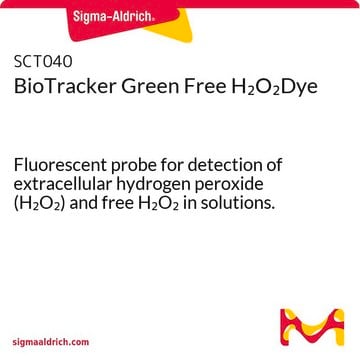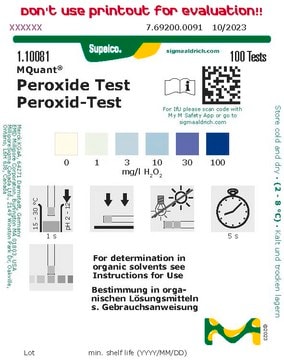MAK166
Fluorimetric Hydrogen Peroxide Assay Kit
sufficient for 500 fluorometric tests (infrared fluorescence)
Synonym(s):
Hydrogen Peroxide Detection Kit
Sign Into View Organizational & Contract Pricing
All Photos(2)
About This Item
Recommended Products
usage
sufficient for 500 fluorometric tests (infrared fluorescence)
detection method
fluorometric
relevant disease(s)
orthopedic diseases; cardiovascular diseases; aging/geriatric diseases; neurological disorders; pulmonary disorders
storage temp.
−20°C
Related Categories
General description
Hydrogen peroxide, a reactive oxygen species produced through the metabolism of molecular oxygen, serves as both an intracellular signaling messenger and a source of oxidative stress. Hydrogen peroxide is generated in cells via multiple mechanisms such as the NOX-mediated ROS production by neutrophils and macrophages (respiratory burst) or by the dismutase of superoxide anions produced as a result of electron leak during mitochondrial respiration. Abnormal hydrogen peroxide production contributes to oxidative cell damage and the progression of diseases such as asthma, atherosclerosis, osteoporosis, and neurodegeneration.
Application
Fluorimetric Hydrogen Peroxide Assay Kit has been sued to determine the oxidation pressure (H2O2).
Features and Benefits
This assay is compatible with high-throughput handling systems.
Suitability
The Fluorescent Hydrogen Peroxide Assay Kit provides a simple and reproducible method to quantify hydrogen peroxide levels in a variety of samples such as cellular extracts and solutions.
Principle
Fluorimetric Hydrogen Peroxide Assay Kit can also be used to detect hydrogen peroxide released from living cells or produced by oxidase activities. This kit utilizes a peroxidase substrate that generates an infrared fluorescent product (λex = 640/λem = 680 nm) after reaction with hydrogen peroxide that can be analyzed by a fluorescent microplate reader. The generation of the fluorescence product is pH independent between pH 4 to pH 10 and is superior to other fluorescence kits for measuring hydrogen peroxide in low pH solutions which often display decreased probe sensitivity. The infrared fluorescent probe is less sensitive to assay background due to autofluorescence from biological samples. This assay is compatible with high-throughput handling systems.
Signal Word
Danger
Hazard Statements
Precautionary Statements
Hazard Classifications
Resp. Sens. 1
Storage Class Code
10 - Combustible liquids
Flash Point(F)
Not applicable
Flash Point(C)
Not applicable
Choose from one of the most recent versions:
Already Own This Product?
Find documentation for the products that you have recently purchased in the Document Library.
Customers Also Viewed
Formation of an angular aromatic polyketide from a linear anthrene precursor via oxidative rearrangement.
Gao G, et al.
Cell Chemical Biology, 24(7), 881-891 (2017)
The mechanism of iron-compensation for manganese deficiency of Streptococcus pneumoniae.
Cao K, et al.
Journal of Proteomics, 184, 62-70 (2018)
Guixi Gao et al.
Cell chemical biology, 24(7), 881-891 (2017-07-18)
Bacterial aromatic polyketides are a group of natural products synthesized by polyketide synthases (PKSs) that show diverse structures and biological activities. They are structurally subclassified into linear, angular, and discoid aromatic polyketides, the formation of which is commonly determined by
Miyuki Takashima et al.
Journal of inflammation research, 14, 4053-4067 (2021-08-31)
Milk depression is the major driver of economic loss due to mastitis in dairy animals. The aim of this study was to identify potential mediators of milk depression by investigating the local and systemic changes in gene expression or cytokine
Fritz Schweikart et al.
Analytical chemistry, 91(3), 1748-1751 (2019-01-24)
HPLC coupled to both UV and MS is an established setup for purity assessments in many areas. With evolving technology, instrument sensitivity increases, calling for lower sample concentration, while light flux in a commercial UV detector cell is considerably higher
Our team of scientists has experience in all areas of research including Life Science, Material Science, Chemical Synthesis, Chromatography, Analytical and many others.
Contact Technical Service








